Disclaimer: today’s post is going to be a little different. Not my usual sharing with regard to our recent travel to Israel. Yes, there are references made here to our travel, but this week, this is what has been on my heart to share.
Luke 10:25-37 (NIV translation)
The Parable of the Good Samaritan
On one occasion an expert in the law stood up to test Jesus. “Teacher,” he asked, “what must I do to inherit eternal life?” “What is written in the Law?” he replied. “How do you read it?” He answered, “‘Love the Lord your God with all your heart and with all your soul and with all your strength and with all your mind’; and, ‘Love your neighbor as yourself.’”
“You have answered correctly,” Jesus replied. “Do this and you will live.”
But he wanted to justify himself, so he asked Jesus, “And who is my neighbor?”
In reply Jesus said: “A man was going down from Jerusalem to Jericho, when he was attacked by robbers. They stripped him of his clothes, beat him and went away, leaving him half dead. 31 A priest happened to be going down the same road, and when he saw the man, he passed by on the other side. 32 So too, a Levite, when he came to the place and saw him, passed by on the other side. 33 But a Samaritan, as he traveled, came where the man was; and when he saw him, he took pity on him. 34 He went to him and bandaged his wounds, pouring on oil and wine. Then he put the man on his own donkey, brought him to an inn and took care of him. 35 The next day he took out two denarii[c] and gave them to the innkeeper. ‘Look after him,’ he said, ‘and when I return, I will reimburse you for any extra expense you may have.’
“Which of these three do you think was a neighbor to the man who fell into the hands of robbers?”
The expert in the law replied, “The one who had mercy on him.”
Jesus told him, “Go and do likewise.”
Go and do likewise.
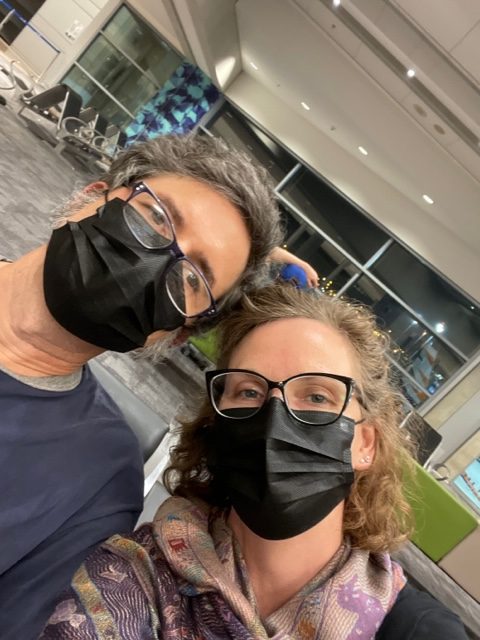
Weary travelers on the way home after quarantining in Tiberias, Israel.
Our flight out of Tel Aviv boarded at 12:30 a.m. Monday, July 11, preparing for a 12 hour flight.
Thomas’ humor never ceased to fail no matter our circumstances…he said, “Look honey, we are at our gate, D8, which sounds like “date”, so we are on an official ‘date night’ together in Israel!”
There is no other way to begin this post other than with The Parable of The Good Samaritan. It is no longer a parable for me, it’s a true story…actually it’s many true stories all at once, from ancient times to today – an infinite loop from which we can all drink from the well. In these past several days of quarantine, we have experienced many Good Samaritans. From the woman in Tiberias, Israel, waiting in line for her own medical treatment, she translated the nurse’s spoken Hebrew for us, to the office manager at the St. Cloud airport in the U.S. who forgave our extended-time parking fees. We have been living in the light of Good Samaritans. What we have learned, despite what mainstream media wants us all to internalize, is that people are good. Good people don’t make the news though, right? So today, I want to exclaim from the mountain top of my soul that people are good.
People are good and I am not in charge.

I am so grateful that G-d reminds me every day, sometimes moment to moment, that I am not in charge. I mean, I am in charge of how I respond to my circumstances. You see, I am what James C. Dobson, the infamous pastor and psychologist, would have labeled “the strong-willed child”. I learn daily that I am not in charge of the universe. Um, yep, I am that ego. More times than not in my life, I have acted/responded as if I can control time, or even worse, those around me. It takes “strong medicine” to teach me that my locus of control is inside me and me only. So (some days through gritted teeth but in complete humility), I say, “thank you, G-d, for teaching me this lesson over and over again in such creative ways!”

https://www.pexels.com/photo/hands-with-latex-gloves-holding-a-globe-with-a-face-mask-4167544/
Yes, sometimes these reminders come in painful ways, like testing positive for Covid during a pilgrimage to Israel, but nonetheless, I am grateful…well…maybe not at the moment, but in hindsight, I truly am forever grateful. Besides, if I am being totally honest, if I was in charge, my life would be an utter disaster! Married at barely 18 against my parents wishes with little to no understanding of the world, I was a hot mess – naive and bullheaded – a recipe for chaos – at that age I was kind of like that Tasmanian Devil character from Looney Toons, Taz. I had summered in Germany twice before graduating from high school and that did help with knowing that my experience of the world was not universal, but my decisions early on in life created so much chaos for me.
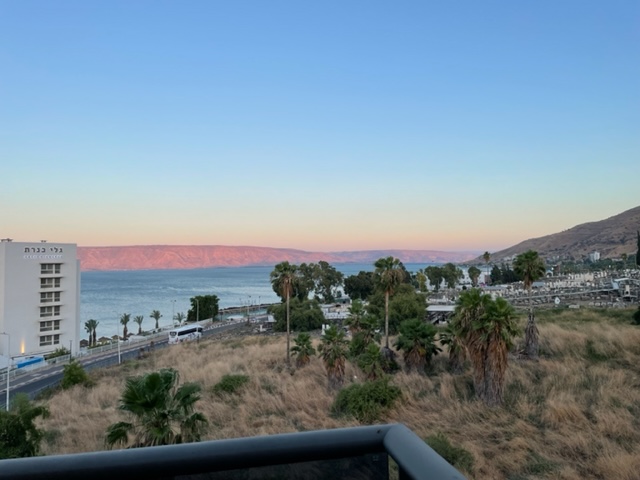
If God actually intended for everything to happen, then God is responsible for every terrible thing that happens in our world. It would mean that tragedies do not happen in spite of God’s will but because of it. If this way of thinking is true, then every rape, every murder, every act of child abuse, every war, every terrible storm or earthquake that claims people’s lives, every child that dies of starvation—all these are part of God’s plan. That is the awful truth we must confront when we buy into the half truth that everything happens for a divinely ordained reason.
Chapter 1, Half Truths: God helps those who help themselves and other things the Bible doesn’t say, Rev. Dr. Adam Hamilton (c) 2016 Abingdon Press, Nashville
People are good. I am not in charge. Everything doesn’t happen for a reason.
The first part of my travel story began long before plans were laid for our trip with CLAL. All was well with the world, I was in my second year at Luther Seminary, and I was registered for winter term, specifically registering for Rev. Dr. Matthew Skinner’s course that included a pilgrimage, “CD 1613: The Holy Land: Its People, Places, and Prayers”. It was imperative that I take this course because it would fulfill a vital part of what I needed toward ordination in the Methodist Conference.
The syllabus was extensive so I purchased all of the books the day I registered and printed all the online articles, putting them in a three-inch, three-ring binder – as I said, A LOT of reading was required so I had to get started right away. And then Covid. The course was cancelled. My heart sank. No! No! No! This can’t be happening!
(FYI: I included the reading list at the end of this post – I highly recommend all of this material should you care anything about Biblical context and human history).
Then I received an email from CLAL. It was not random as Dr. Skinner’s course does include CLAL as a partner. As I read the email, I understood I was being offered a fellowship, and in addition, we could invite a companion. Companion costs were not covered but would get all the group pricing advantages that CLAL had access to as a global agency. It was a no-brainer for me and I emailed and said, “YES! YES! YES!” Only a short time later, the trip was cancelled due to Covid. Needless to say, after all the work to align the funds and turn in all the extensive documentation needed for traveling to Israel, etc., it was so disappointing. As you know though, since you are following this blog, the trip was eventually back on, thank you to the diligent work of CLAL’s leadership!
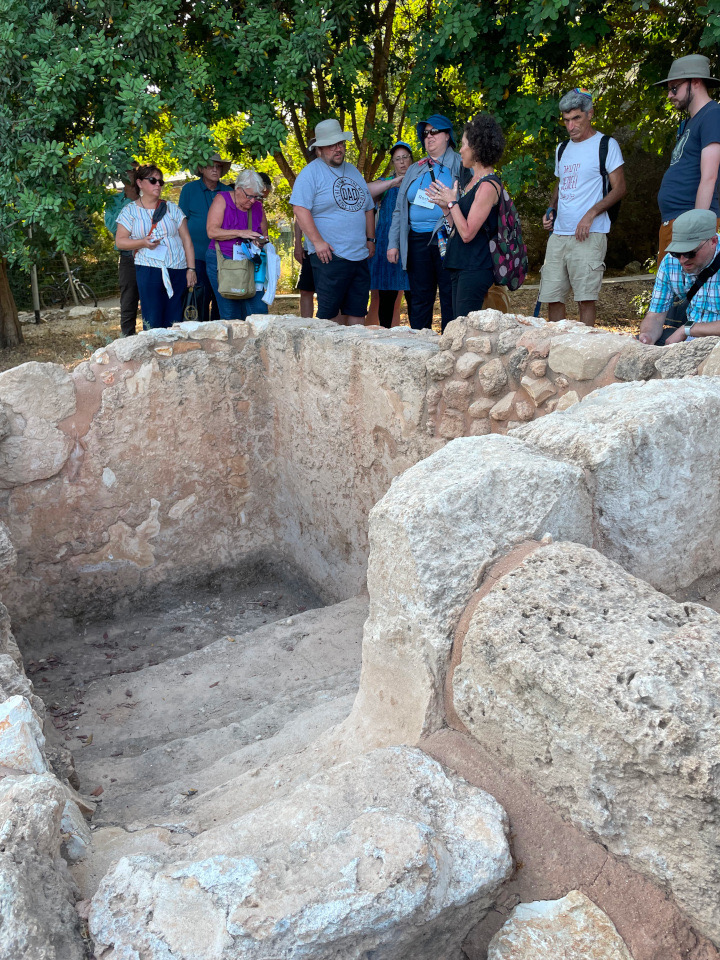
Then came news that I would be moved to a new appointment, which would mean a physical move from one parsonage to another – a whole new town, a whole new congregation, and this would come right at the end of my already very intense semester at Luther, my work with TESL students at SCSU, and just as our eldest son, Elliot, was graduating high school. Thomas and I would be in the midst of planning for international travel and balancing very full schedules. Needless to say, I was feeling pretty overwhelmed but we kept to the plan for travel.
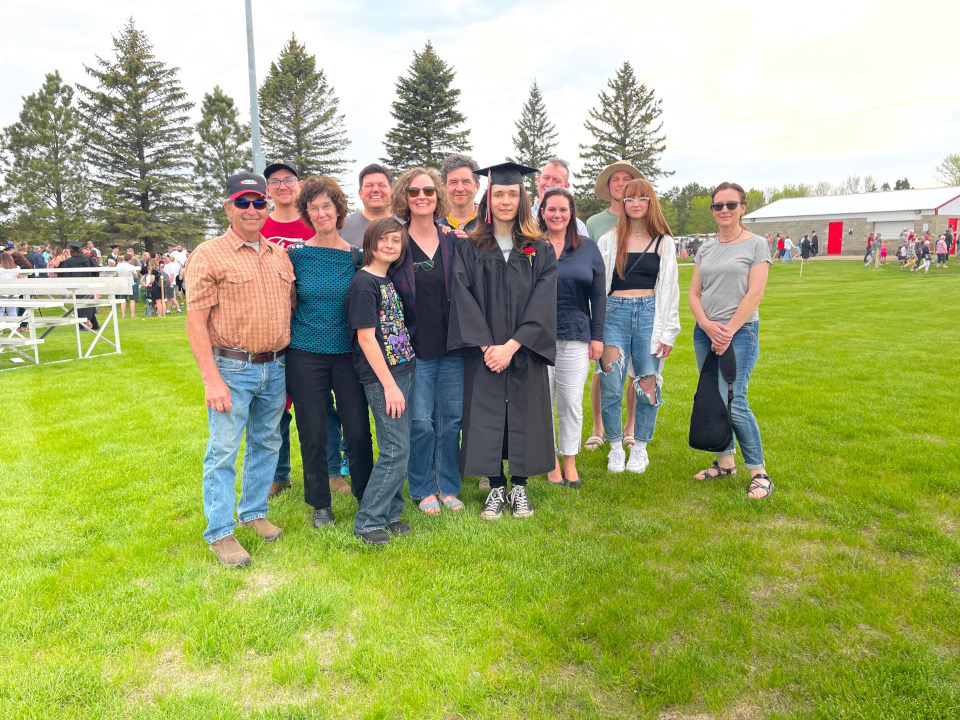
Pictured here with many of our immediate family members: (left to right)
Back row: Oren, Wayne, Thomas, Aaron, Hagen
Second row: G’pa Noel, G’ma Linda, Amy, Elliot, Lyndsey, Lydia,
Front row: Sawyer and Char
Not pictured: Nora and Kellen, Elyse, Abby (Hagen), Ariana & Zach & little Jettson, Issy (Lynds & Aaron)
So many Good Samaritans have made it possible for us to move seamlessly through all of these transitions this Spring and Summer. From the three movers from Mayflower that were with us for two days to get our parsonage moved from Atwater to Alexandria, to the kindnesses of so many people who made my leaving and arriving at both churches a beautiful experience, to our fellow traveling companions while in Israel, who have stayed the course, providing so much pastoral care for Thomas and I as we have navigated the experience of The Holy Land together, including this time of quarantine. My heart is “strangely warmed”, as Wesley once said, and it’s no longer challenging for me to answer little Morgan from Sunday School’s question, “What does holy mean, Pr. Amy?” Holy means the sacred place of human relationship. Holy ground isn’t only found in Israel by the Sea of Galilee or on the Mount of Olives, holy ground is everywhere; it is everywhere that human beings engage in the work/ministry of kindness to one another.
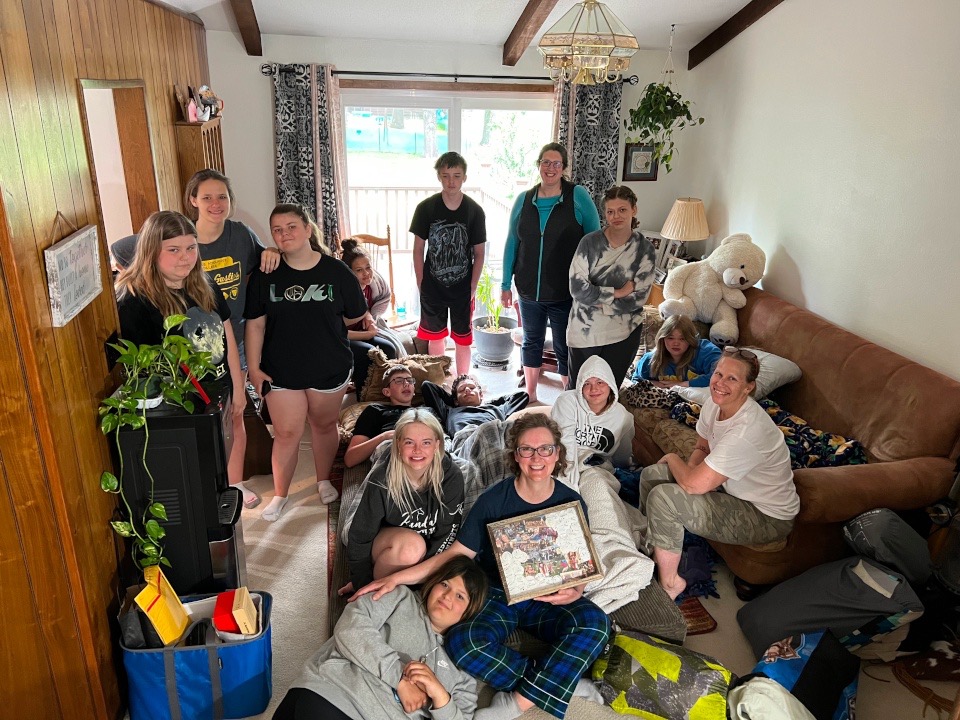
People are good.
I am not in charge.
Everything doesn’t happen for a reason.
Holy ground is everywhere.
The excerpts below are from the Winter 2022 Syllabus for CD 1613: The Holy Land: Its People, Places, and Prayers, a course offered at Luther Seminary. The syllabus information I have shared here was created by Dr. Matthew Skinner and shared by me here with intentions to help connect readers to material and context that is vital for helping all of us better understand and relate to ancient history and to modern day Israel; additionally, my hope is to open minds to what could be possible should readers be interested in an opportunity of discovery. Links are given below for contacting Luther Seminary to learn more.
Course Description: An introduction to the history, cultures, and peoples of Israel and Palestine. Participants in this course visit places holy to Christians, Jews, and Muslims, exploring the biblical texts associated with those places and the opportunities they present for enhancing preaching and teaching. Participants also learn about current geopolitical realities in the region, visiting with Palestinians and Israelis and hearing their stories, their struggles, and their hopes for the future. The class will include historical and theological reading, reflection, and discussion. This course will have a significant cross-cultural learning component. This travel course can be taken for either a half course credit or a full (one) course credit. For those taking the course for a full course credit, note that you will have more extensive course assignments, as explained below in blue italics. There are no prerequisites for this course.
Reading List:
Two beautifully written attempts to peer into the cultures and conflicts of the land though snapshots of ordinary people and families, showing how their communities’ histories, pains, and hopes are interwoven:
Stephanie Saldaña, A Country Between: Making a Home Where Both Sides of Jerusalem Collide (Sourcebooks, 2017); ISBN 9781492639053. See especially Part Two: Nablus Road (pp. 59–148).
Sandy Tolan, The Lemon Tree: An Arab, a Jew, and the Heart of the Middle East
(Bloomsbury, 2007); ISBN 9781596913431.
A handful of Israeli authors’ attempts—some more detailed than others—to recount the history of Zionism and the development of the modern state of Israel in ways that shine a light on what was heroic and what was horrific:
Daniel Gordis, Israel: A Concise History of a Nation Reborn (Ecco, 2017). ISBN
9780062368751.
Yossi Klein Halevi, Like Dreamers: The Story of the Israeli Paratroopers Who Reunited Jerusalem and Divided a Nation (Harper Perennial, 2014); ISBN 9780060545772.
Ari Shavit, My Promised Land: The Triumph and Tragedy of Israel (Spiegel & Grau, 2015); ISBN 9780385521710. See especially Chapters 5–6, 8–9, 17–18 (pp. 99–173, 201–36, 393–451).
Noa Tishby, Israel: A Simple Guide to the Most Misunderstood Country on Earth (Free Press, 2021); ISBN 9781982144937.
A couple of Palestinian Christian leaders’ descriptions of the religious and political significance of the Palestinian people’s roots in the land, their ongoing hardships, and the character of Christian ministry and biblical exegesis in Palestinian settings:
Elias Chacour, Blood Brothers: The Dramatic Story of a Palestinian Christian Working for Peace in Israel (rev. ed.; Baker, 2013); ISBN 9780801015731.
Mitri Raheb, Faith in the Face of Empire: The Bible through Palestinian Eyes (Orbis, 2014); ISBN 9781626980655.
Mitri Raheb, I Am a Palestinian Christian (Fortress, 1995); ISBN 9780800626631.
Two Palestinian perspectives on life in the land:
Sayed Kashua, Native: Dispatches from an Israeli-Palestinian Life (reprint edition; Grove Press, 2017); ISBN 9780802126290.
Raja Shehadeh, Palestinian Walks: Forays into a Vanishing Landscape (Scribner, 2008); ISBN 9781416569664.
Perspectives on religious pluralism, written by contemporary Jewish authors:
Brad Hirschfield, You Don’t Have to Be Wrong for Me to Be Right: Finding Faith
without Fanaticism (Harmony, 2009); ISBN 9780307382986.
Jonathan Sacks, The Dignity of Difference: How to Avoid the Clash of Civilizations (2nd ed.; Continuum, 2003); ISBN 9780826468505.
Recent novels, one by a Palestinian-American, one by an Irish-American, and one by an Israeli-American:
Hala Alyan, Salt Houses (Houghton Mifflin Harcourt, 2017); ISBN 9780544912588.
Colum McCann, Apeirogon: A Novel (Random House, 2020); ISBN 9781526607898.
Moriel Rothman-Zecher, Sadness is a White Bird: A Novel (Atria Books, 2018); ISBN 9781501176265.
Informative books on how Muslims view Jesus and how Christian belief about Jesus forges connections and creates obstacles between Muslims and Christians (helpful if you’re looking to broaden your sense of interfaith dialogue):
Mona Siddiqui, Christians, Muslims, and Jesus (Yale University Press, 2013); ISBN 9780300205275.
On Jewish identity in antiquity:
Shaye J. D. Cohen, The Beginnings of Jewishness: Boundaries, Varieties, Uncertainties (University of California Press, 2001); ISBN 9780520226937.
On archaeologists’ insights into the culture and locations of Jesus’ lifetime (these are the most technical/academic books on this whole list of recommended readings):
Eric M. Meyers and Mark A. Chancey, Alexander to Constantine: Archaeology of the Land of the Bible (Yale University Press, 2014); ISBN 9780300205831.
Marianne Sawicki, Crossing Galilee: Architectures of Contact in the Occupied Lands of Jesus (Trinity Press International, 2000); ISBN 9781563383076.
On interpreting Christian scripture in ways that do not misrepresent historical or contemporary Judaism (this very useful book includes commentary on the entire New Testament which appear on pages 579–766):
Amy-Jill Levine and Marc Zvi Brettler, eds., The Jewish Annotated New Testament (2nd rev. ed; Oxford University Press, 2017); ISBN 9780190461850.
And since you stayed to read this whole blog, (WOW! and Thank you – you are very patient with me), let me leave you with a small gift – here is one more reading recommendation that I am diving into this summer and without any doubt, I know you will find to be worthy of your time:

Rabbi Ner-David is involved in peace work, promoting a shared society for Jews, Christians, and Muslims in the Galilee, where she lives with Jacob, her life partner of 32 years, their seven children, and their dog and cat. She also lives with a genetic muscular disease called FSHD, which has been one of her greatest teachers. Visit her website, http://www.rabbihaviva.com
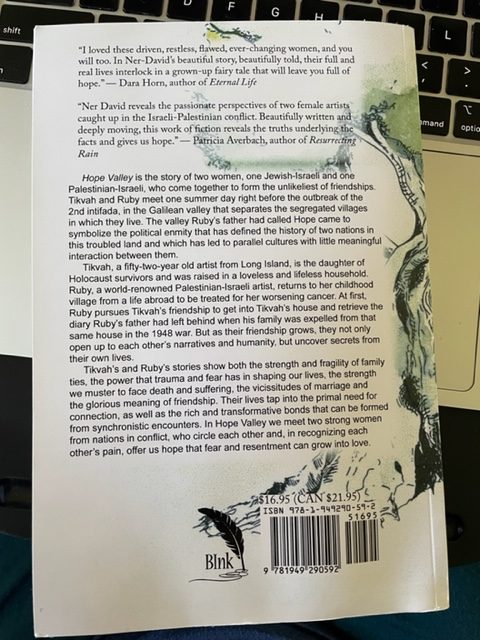
Inside cover: “To all of those in Galilee and beyond whose stories have helped me cling to hope.”
Leave a Reply